The summer of 2019 actually promised to bring about a major turnaround in cycling. Our Federal Minister of Transport, Andreas Scheuer, made a promise to work hard for the wishes and demands of cyclists at the start of the new year. In this move, he appointed himself "Minister of Cycling" and regularly posted photos of himself riding a bicycle. Another major achievement for the cycling community was a decision made by the Transportation Commission in the spring. The Transportation Commission, established by the federal government, decided to fund cycling with 900 million euros annually. The federal government hopes that this large injection of funds will create a better atmosphere and infrastructure for cyclists and that more and more people will switch from cars to bicycles. This should help to achieve the agreed Paris climate targets.

But when the Bundestag presented the budget for 2020, there was no longer any talk of funding of 900 million euros. Instead, cycling is to receive financial support of only 130 million euros per year. This means that instead of the announced increase, there will even be a cut in the budget! Compared to the previous year, there are suddenly 20 million euros less available to support cyclists. This decision caused great resentment and incomprehension on the part of the population and bicycle associations. Burkhard Stork of the bicycle club ADFC (the General German Bicycle Club) is defending himself against the federal budget cut. He accuses the Minister of Transport and the Bundestag of leaving the municipalities to their own devices with the traffic turnaround. He also argues that without the active support of the federal government it is not possible to bring about the traffic turnaround alone. Stork and the entire ADFC are calling for an investment offensive by the federal government of 900 million euros annually in cycling.

This decision is also met with incomprehension by many citizens. The question is who will advise the Transport Minister Scheuer, since his ministry has already spent 47.7 million euros on external consultants in the first half of 2019. In this move, the very questionable bicycle helmet campaign "Looks like shit. But saves my life" falls under scrutiny. This campaign alone cost the federal government almost 400,000 euros just because they cooperated with Germanys Next Top Model. But no money was spared here, despite the fact that cycling already has a small budget. It becomes clear that the transport minister has spent a lot of money on consultants, press and public relations work, but has done nothing for cycling. Many criticize Scheuer saying that he should have invested the money in good bike paths, model projects such as bike parking garages and bike expressways.

Various studies have also shown that many people only switch to cycling when a well-developed infrastructure is available, making cycling the most sensible and effective means of transport in the city. Here it becomes very clear that ecological or health aspects alone are far from being sufficient to encourage the masses of people to cycle. There have been enough examples of very good infrastructure in cities for a long time. Cities such as Copenhagen and Amsterdam are leading the way. But a similarly strong cycle traffic can not be achieved through campaigns, fancy pictures or simply by paying lip service. Concrete action is needed here, as well as sufficient funding.



